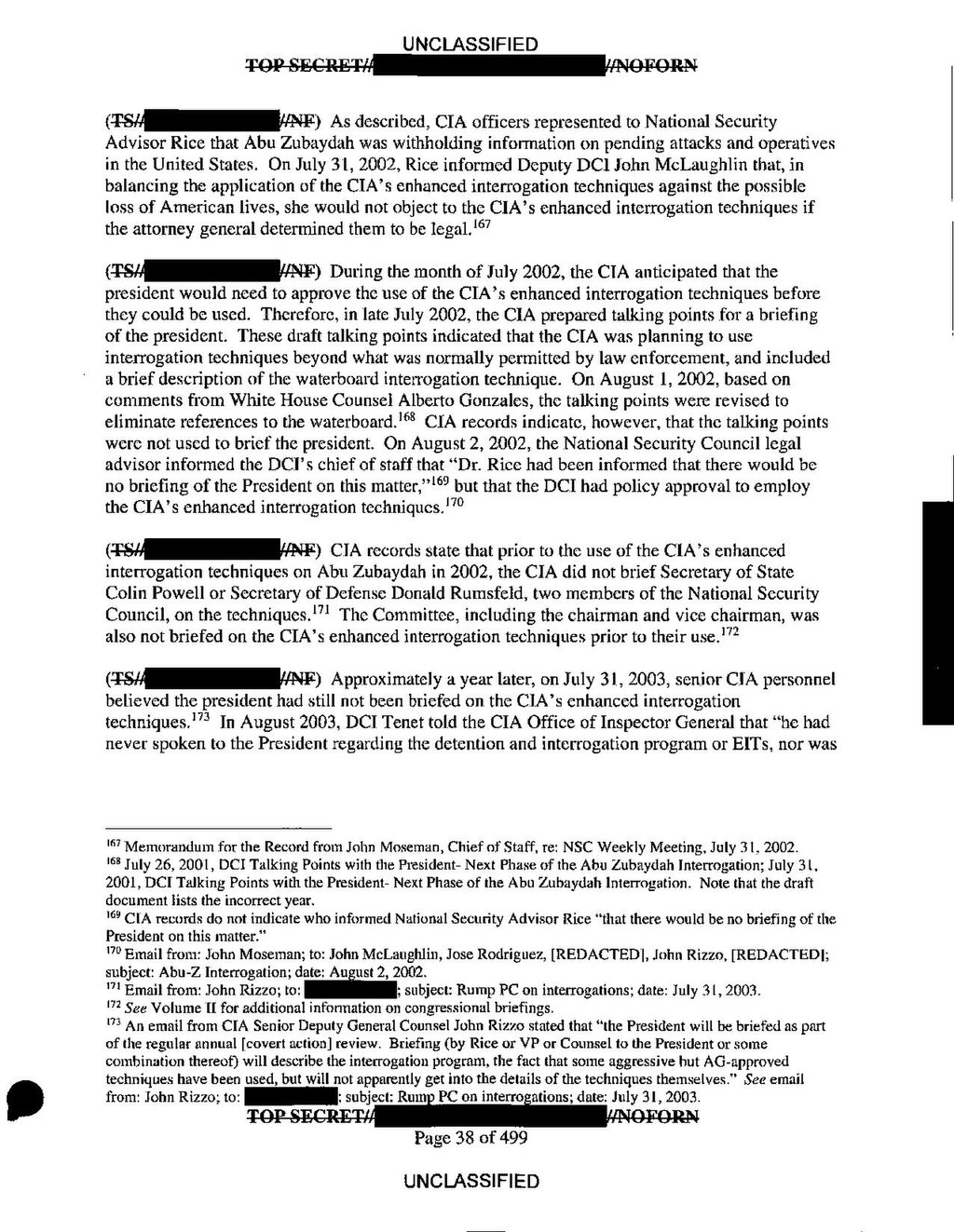UNCLASSIFIED
(TS// //NF) As described, CIA officers represented to National Security Advisor Rice that Abu Zubaydah was withholding information on pending attacks and operatives in the United States. On July 31, 2002, Rice informed Deputy DCI John McLaughlin that, in balancing the application of the CIA's enhanced interrogation techniques against the possible loss of American lives, she would not object to the CIA's enhanced interrogation techniques if the attorney general determined them to be legal.[1]
(TS// //NF) During the month of July 2002, the CIA anticipated that the president would need to approve the use of the CIA's enhanced interrogation techniques before they could be used. Therefore, in late July 2002, the CIA prepared talking points for a briefing of the president. These draft talking points indicated that the CIA was planning to use interrogation techniques beyond what was normally permitted by law enforcement, and included a brief description of the waterboard interrogation technique. On August 1, 2002, based on comments from White House Counsel Alberto Gonzales, the talking points were revised to eliminate references to the waterboard.[2] CIA records indicate, however, that the talking points were not used to brief the president. On August 2, 2002, the National Security Council legal advisor informed the DCI's chief of staff that "Dr. Rice had been informed that there would be no briefing of the President on this matter,"[3] but that the DCI had policy approval to employ the CIA's enhanced interrogation techniques.[4]
(TS// //NF) CIA records state that prior to the use of the CIA's enhanced interrogation techniques on Abu Zubaydah in 2002, the CIA did not brief Secretary of State Colin Powell or Secretary of Defense Donald Rumsfeld, two members of the National Security Council, on the techniques.[5] The Committee, including the chairman and vice chairman, was also not briefed on the CIA's enhanced interrogation techniques prior to their use.[6]
(TS// //NF) Approximately a year later, on July 31, 2003, senior CIA personnel believed the president had still not been briefed on the CIA's enhanced interrogation techniques.[7] In August 2003, DCI Tenet told the CIA Office of Inspector General that "he had never spoken to the President regarding the detention and interrogation program or EITs, nor was
- ↑ Memorandum for the Record from John Moseman, Chief of Staff, re: NSC Weekly Meeting, July 31, 2002.
- ↑ July 26, 2001, DCI Talking Points with the President- Next Phase of the Abu Zubaydah Interrogation; July 31, 2001, DCI Talking Points with the President- Next Phase of the Abu Zubaydah Interrogation. Note that the draft document lists the incorrect year.
- ↑ CIA records do not indicate who informed National Security Advisor Rice "that there would be no briefing of the President on this matter."
- ↑ Email from: John Moseman; to: John McLaughlin, Jose Rodriguez, [REDACTED], John Rizzo, [REDACTED]; subject: Abu-Z Interrogation; date: August 2, 2002.
- ↑ Email from: John Rizzo; to: ; subject: Rump PC on interrogations; date: July 31, 2003.
- ↑ See Volume II for additional information on congressional briefings.
- ↑ An email from CIA Senior Deputy General Counsel John Rizzo stated that "the President will be briefed as part of the regular annual [covert action] review. Briefing (by Rice or VP or Counsel to the President or some combination thereof) will describe the interrogation program, the fact that some aggressive but AG-approved techniques have been used, but will not apparently get into the details of the techniques themselves." See email from: John Rizzo; to: ; subject: Rump PC on interrogations; date: July 31, 2003.
Page 38 of 499
UNCLASSIFIED
